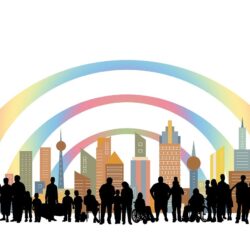Having read around the Fiona Pilkington case further I am still sticking to my point that less is sometimes more. Without enough knowledge on the legal aspects I would hate to comment in a blaze of glory I would regret later. I will say that any news that highlights crimes against someone due to disability has to be a positive move, even if the solutions are more around general law enforcing practices.
Reading around Fiona and her family’s isolation and exclusion from society got me thinking more on the subject of inclusivity. I think I have always been quite outspoken that my upbringing was more inclusive. However there have been, still are and always will be times when I feel this sense of difference. For me they have often come with change. Starting primary and secondary school, university and moving to London were all massive changes with things to consider that most would never imagine – Access, personal care and of course new people. I can chart the changes of attitude in a person I meet, from assuming I may not have any sense or speech, being patronising, to apprehension of what to say in not offending me and finally “I don’t see you as disabled”! It’s a necessary must to walk people through this but a tad tedious sometimes, especially when it’s a more superficial meeting in say a club and there is not the time for such a journey.
Once the change has occurred and things settled down I gain more confidence knowing my surroundings. I am then more apt at grabbing life and pushing onwards to achieve in all senses compared to non-disabled people too. Its about understanding yourself, understanding other and being positive and pragmatic to remove the barriers placed in your way.
The real problem of exclusion is when you have limited access, limited/no personal care and are unable to meet and bond with new people always. Despite every effort to integrate and achieve with the most sociable, intelligent being – it is simply impossible. Take a very close friend of mine. Since moving into a new city it took them months to get a flat, they are still not receiving enough care and hence have less chances to be out and about and embrace what should be a new time after uni, meeting many new friends and having new experiences. The knock on effect is periods of depression and questioning things that were once obvious set in. The horror of this from a social care perspective is the “savings” made, are lost in other ways with reduced physical health levels and mental health implications.
The result of what I am saying here is social exclusion can be overcome but by a long term strategy. Instead of cutting costs on access and personal care in the short term, we are losing more in physical and mental health care costs, have a loss of economic input and tax revenue, while overall happiness and welfare plummets. The answer is to provide these basic factors so people can flourish into who they want to be, society benefits as a whole and the public will see disabled people more included and easier to chat with in an instant, like they would with anyone and everybody else.





